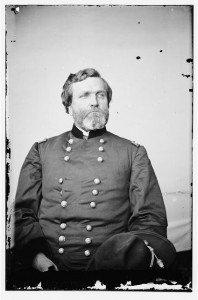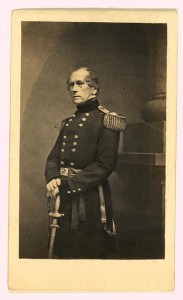The last we saw of the 19th NY Volunteer Infantry it was encamped at Pleasant Valley, Maryland as part of General Banks’ army. During the month of August there was some grumbling in the 19th. Initially they had assumed that their federal service would end on August 22, 1861 because they were mustered in for three months. However, on August 12th the regiment’s colonel told his men that the President required the regiment for all of its two year state service. This did not go down well with a lot of the troops, who didn’t know that was a possibility when they signed up in April.
On August 21 the regiment reached Hyattstown, Maryland near the headquarters of General Banks.
From Cayuga in the Field by Henry Hall and James Hall:
August 16th, Col. Thomas received orders to move his brigade from Pleasant Valley to the valley of the Monocacy and encamp, at the village of Hyattstown, 10 miles south of Frederick. The 19th struck camp next day and with the whole brigade moved by short, though toilsome marches, over slippery, saturated roads, to the designated point, camping on the way at Jefferson and Buckeystown. On the evening of the 21st, the regiment pitched tents at Hyattstown on the slope of a verdant hill, in the midst of the camps of the brigade and army, which filled this beautiful portion of the valley. Near the hill was the headquarters of Gen. Banks. News reached the men here that the people of Auburn thought they ought to remain in the service and “show their manhood by fighting the thing through.” The regiment thought that people did not understand the question very well at home. It proposed, however, to stay and fight it through, quite unanimously. Some grumbled, but the subject was pretty thoroughly canvassed that night and the majority resolved to bury the remembrance of their wrongs and do whatever the Government ordered. Little speeches by some of the
Captains to their commands helped determine them.
At 9 A. M., August 22d, the drum corps beat the signal for dress parade. Curiosity brought every man out on the green, where, in a few moments, Adjutant Stone had the line formed, and reported the same to Major Ledlie, commanding in the absence of Lieut. Col. Seward. By the Major’s direction, the right wing then faced to the right, and countermarched, which brought the two wings in parallel lines facing inwards. While this was being done, what was the astonishment, not to say mortification and anger, of the 19th, to perceive the 21st Pennsylvania, Col. Biddle commanding, come up the hill on a run, bristling with steel, and wheel round into line on the right of the 19th, but facing it. Col.Thomas’s 2d Cavalry, dismounted, approached briskly to a similar position on the left, with carbines capped and loaded. And what lay there on the crest of the hill? Not thirty rods away, a battery of Parrot cannon, Perkins’s Rhode Island, unlimbered, pointed its black, angry muzzles threateningly on our position, the artillerists lying or sitting on the ground in their places, ready to spring up and blow the regiment to atoms on a second’s warning. Other regiments were under arms in camps around the hill. In line of the lane between the two wings of the 19th, stood Col. Thomas, stern, impassive, with folded arms, keenly watching the deportment of the terrible, but now wounded and mortified warriors from the peaceful hills and vales of far away Central New York, for whom all this muster of forces had been made. By him were his staff, Col. Clark, and several reporters.
The meaning of all this was only too obvious, and many a brave man’s eyes filled with tears in the regiment at the unmerited insult, as in silence all awaited what was coming next.
Major Ledlie, attended by his staff, now came between the
wings of the regiment, and addressed the men as follows: —
“Soldiers of the 19th Regiment, New York Volunteers:
“This is the 22d of August, the day on which your term of three months expires. But the President has made requisition for the further services of the 19th regiment, and the Governor has transferred you to the United States for the remainder of the term of two years, for which you enlisted into the State service, which will be one year and eight months.”
Adjutant Stone then read Special Order No. 323, and one or two Articles of War apropos to the occasion. The men, then stacking arms, marched a few paces to the rear and again faced inwards. No attempt was made to explain the matter to the men, nor was there any proffer of a new muster. Major Ledlie commanded all who were loyal to advance and take their guns. Every officer in the regiment stepped forward at the word. Kennedy’s and Stewart’s companies, B and G, were not a moment behind. Smothering their feelings, they marched squarely up to the stacked arms. One man in Stewart’s company only lingered behind. Companies C, H and K also moved up all but unanimously. The larger part of the other companies, however, resenting the fresh insult of the day, stood fast in their places. Their officers remonstrated without avail. Two hundred and eighty refused to serve a day longer. They declared that their time was out. It speaks well for the character of the 19th regiment that, under the circumstances, more of it did not refuse. In Gavigan’s company, one man only took his gun, and he did so because, having enlisted at Elmira specifically as a three months’ man, his time would expire any way in a short time. Col. Clark came down and reasoned with Gavigan’s men against standing out, but failed to shake their resolution. “Well, they show their true Irish grit,” he said, as he turned away and left them.
Col. Thomas at length put an end to the exciting scene by ordering the recusants under arrest. Capt. Stewart’s company was ordered to guard them till he could bring up the cavalry. One of the company rebelled at this and threw down his gun, refusing to stand over his own comrades. The rest complied quietly but gravely. The cavalry then came up. The recruits hung their equipments on their guns and marched down hill to the camp of Col. Biddle’s Bucktails, where they were quartered in the edge of a grove in the old “cow-pen.”
…
After the parade, the residue of the regiment returned to camp. The morale of the 19th never fully recovered from the wrongs of that bitter day. It was little consolation to learn from the Rhode Island boys, that had they been ordered to fire on the regiment, they would have put their cartridges shot first into their cannon. Our boys did not fear cannon shot. What they did feel was the moral wounds inflicted on them that day by distrusting their loyalty, and the brutal use of arbitrary power in place of reason and an appeal to pride. These gave them the keenest pangs.
Col. Thomas sent for Capt. Kennedy and Capt. Stewart, during the day, to congratulate them separately on the conduct of their respective commands, and to ask them about the motives which had actuated those who stood out To Capt. Stewart he said, when he had heard the whole story of the regiment’s hardships, “There is something wrong here. Captain. These men are not to blame. They have not been treated right.” Stewart alluded to Thomas having placed him as guard over the recusants, and said it was “the hardest thing he had ever done in his life.” Thomas replied, he “only did it to try his pluck.”
Gen. Banks treated the recusants considerately. He gave them plenty of time to reconsider their action. … But twenty-three held out to the end. Nothing could move them. Even Father Creedon lavished argument on them in vain. They were retained in Col. Biddle’s camp, under guard, until the latter part of September, when they were sent to Fortress Monroe, court martialed, and sentenced to hard labor for two years on the fortifications of the United States. At this place, through the agency of Gen. Wool, they were pardoned, in Special Order No. 107, Nov. 21, 1861, “on condition of serving out the time for which they were enlisted, honestly and faithfully,” in the 2d New York Volunteers, Col. Carr commanding, then at Newport News. The men accepted and went into the 2d Cavalry, and made a good reputation there as soldiers. …
After the 22d of August, camp was changed to the banks of
Seneca creek, south of Hyattstown. On the 28th, Col. Thomas, being called to an important command in the West, relinquished
the 1st Brigade to Col. Biddle, to the very general regret of the
brigade.



Pingback: 19th NY Will Convert from Infantry to Artillery | Blue Gray Review